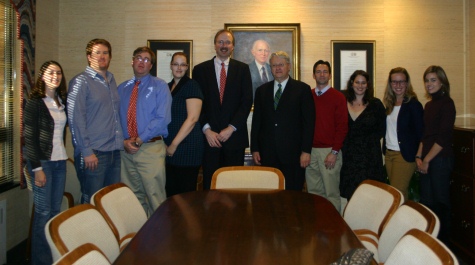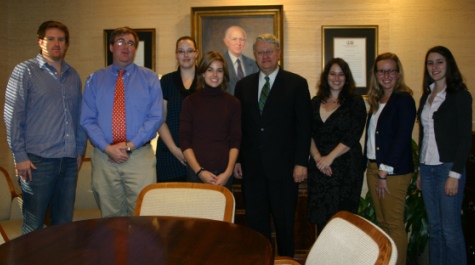Judge Garaufis of E.D.N.Y. Speaks to Civil Procedure Students
The Federal Rules of Civil Procedure have an impact on every federal civil trial, U.S. District Judge Nicholas Garaufis remarked during a special guest lecture to William & Mary civil-procedure students on Dec. 2, 2011.
Judge Garaufis used Rule 1 as an example. “The reality is that it can be very difficult to get lawyers to resolve their disputes quickly and inexpensively,” he told the class. Rule 1, however, states that the rules shall be construed “to secure the just, speedy, and inexpensive determination of cases,” he continued, “so a judge has an obligation to move cases as quickly as he can within the bounds of justice.”
Judge Garaufis explained how different civil rules and doctrines had affected certain cases over which he had presided during his eleven years on the bench. He addressed issues involving motions to dismiss, discovery, case management, and summary judgment.
Judge Garaufis was invited to the Law School by Professor Scott Dodson, one of the Judge’s inaugural law clerks and an expert in civil procedure, to provide a practical counterpart to the civil-procedure lessons Dodson’s class has learned this semester. Judge Garaufis has served on the United States District Court for the Eastern District of New York since 2000, following a unanimous confirmation by the U.S. Senate.
“I am so honored Judge Garaufis could come here to share insights from his experiences on the bench,” said Dodson. “He has developed a reputation as a fair, practical, and forceful judge. I am sure that the students, after a semester of learning civil-procedure rules in the classroom, appreciated hearing how those rules are used in practice.”
Following his lecture, Judge Garaufis met with a small group of upper-level students over coffee to discuss his judicial experiences in more detail. He also praised the law clerks who have worked for him over the years. Describing them as “excellent,” he recalled the many times he left his office to find his clerks deep in discussion over the legal theories they had learned as law students.
In a comment aimed at students who will soon be entering legal practice, the judge—who worked in private practice and as general counsel of the Federal Aviation Administration before taking the bench—urged, “Never rule out taking a certain career path. It’s a lot more fun to have a varied path than to do the same thing for 40 years.”

